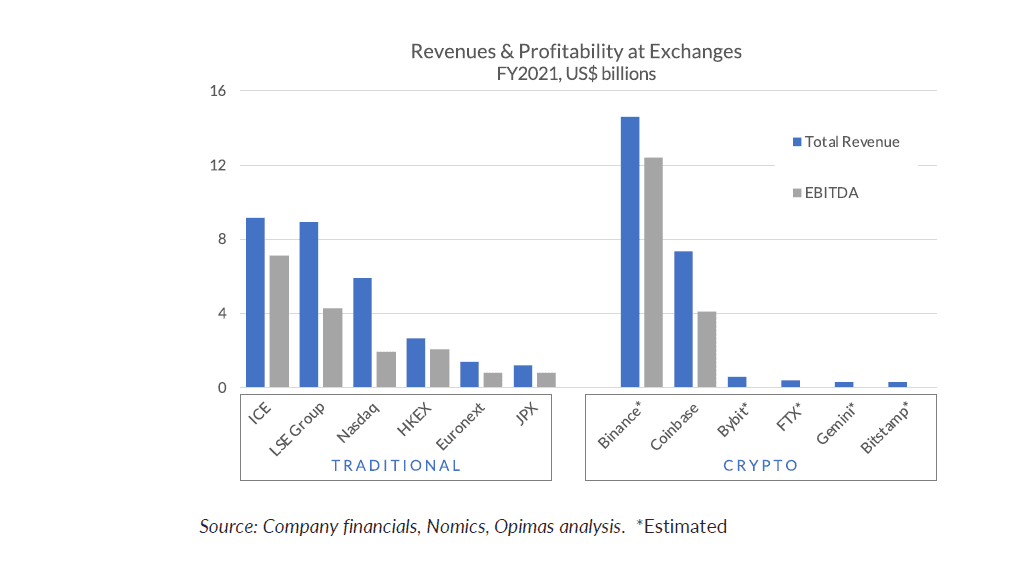Global trading revenue generated by cryptocurrency exchanges hit $24.3 billion in 2021 to surpass total revenue generated by traditional stock exchanges like the New York Stock Exchange and the Nasdaq for the first time ever, according to a report published by financial-services consultancy Opimas.
The report estimates that revenue at crypto exchanges increased seven times from the $3.4 billion in sales recorded in 2020 and was 60% higher than the roughly $15.2 billion brought in by traditional securities exchanges.
“This is quite a shift from only a year earlier, when the traditional exchanges had revenues four times greater than exchanges of the crypto world,” wrote Suzannah Balluffi, an Opimas analyst who covers the digital asset industry. “The old, venerable names like the New York Stock Exchange, Nasdaq, Deutsche Borse and CME have all been left behind in the dust by crypto startups Binance and Coinbase.”
The biggest winner of the explosive growth in crypto trading revenues is Binance Holdings Ltd., which increased its share of spot-market crypto trading volumes from 49% in 2020 to 69% as it raked in an estimated $14.6 billion in trading fees last year.
Opimas
Coinbase Global Inc.
COIN,
the only major crypto exchange to be publicly traded, reported total revenue of $7.8 billion in 2021, up from $1.3 billion in 2020. Opimas estimated the revenues of other crypto exchanges using publicly available data on trading volumes and fees. Only Intercontinental Exchange Inc.
ICE,
which owns the NYSE and the London Stock Exchange Group PLC
LSEG,
had higher revenues than Coinbase last year, while Opimas estimates that Binance’s revenues outstripped those of every traditional exchange.

Opimas
This explosive growth comes against a backdrop of heightened regulatory scrutiny, following President Joe Biden’s recent executive order that directed federal departments and agencies to produce recommendations for oversight of the digital asset industry.
Securities and Exchange Commission Chairman Gary Gensler told MarketWatch in a February interview that beefing up cryptocurrency exchange regulation will be a top priority for the agency in the months and years to come.
He noted that the vast majority of crypto trades happen on centralized exchanges and that “that activity centralized on those platforms they need the investor protection, the market integrity and anti-manipulation” rules that govern markets for other financial assets.
The SEC is mandated to oversee securities exchanges, but not venues where commodities or other assets are traded. Coinbase and other exchanges maintain that digital assets like bitcoin, ether and the dozens of other tokens they offer are not securities and therefore they are not subject to oversight.
Gensler, however, has argued that it is unlikely that none of the digital assets being traded on these platforms are securities. In a recent U.S. Senate hearing, Gensler lamented that Coinbase has not registered with the SEC as a securities exchange, “even though they have dozens of tokens that may be securities.”
Aggressive regulation of securities exchanges has led to changing business models at places like the NYSE, the Opimas report notes. A 2005 rule implemented by the SEC, for instance, required exchanges to take on a duty of best execution, which often means finding the lowest possible price for customers. That rule put pressure on trading fees and caused exchanges to search for other revenue, like fees paid for market data.
The report argues that regulatory risk is one of the most important facing the digital-asset exchange industry, and that these companies will benefit from taking a proactive approach to regulation.
“When it comes to compliance, crypto companies will face a choice: work with regulators or continue to battle against them,” Balluffi wrote. “The latter strategy has resulted in large financial penalties and loss of market share, and we see exchanges moving towards the former, such as Binance and Bitmax.”
